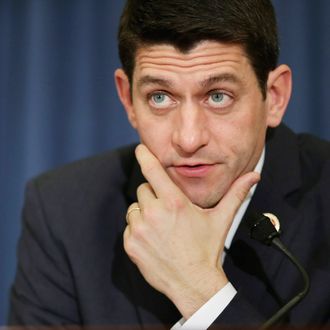
The most eyebrow-raising part of Ryan’s poverty plan — which, as I wrote last week, has a lot of good parts — is his suggestion that low-income households write and execute a contractually binding “life plan” in exchange for government aid. As such, in a funny inversion, conservatives have spent the week arguing for more government bureaucracy and oversight, with liberals arguing against it.
I questioned the idea in part because it seemed to put a burden on poor families that no other recipients of government largesse face. In response, my friend Ross Douthat made a smart point: Many programs are reciprocal or conditional, and those that aren’t, conservatives largely want to do away with. You need to pay into Social Security to get its payout, for instance.
If you’re going to attack the [Ryan plan] for placing conditions on government assistance that aren’t presently placed on aid to other, better-off constituencies, you should recognize that many conservatives who support conditional reciprocity in welfare policy are pretty much all-in for the idea that the idea that yes, those better-off constituencies are getting a sweet deal right now, and that gravy train should simply end: Not with new conditions for corporations or life contracts for rentiers, but with cuts and caps and sunsetting.
That’s a good point. And I agree that we would be having a different debate if the government had eliminated huge numbers of tax expenditures and spending programs that aid specific industries. But even so, I’m not sure that this is the right condition to place on poor families.
Let’s ask ourselves two questions about the proposal: Is it good or bad? And is it right or wrong?
Last question first. As I wrote before, it strikes me as distasteful at best to have poor heads-of-households sit down, explain why they are poor, and map their way out of poverty. We do use conditions in other social programs. We ask recipients of unemployment insurance and welfare, for instance, to demonstrate that they are working or looking for work. It often involves checking in with a human being, tracking your time, and so on. But the “life plan” proposal takes that a gigantic step further — creating, in essence, poverty probation officers who decide whether the poor are working hard enough to receive government aide.
Onto the less thorny question of whether it is good or bad policy — that is, whether it would reduce poverty. We simply don’t know. We’ve never tried it. There’s no evidence. But here’s my gut: Yes, the presence of a social worker, stricter work requirements, and a time limit would help nudge a lot of families out of poverty. Incentives matter. But you would have losers as well as winners — families that get sanctioned, families that don’t make it above the poverty line before their assistance gets cut and then have nothing. I worry about the cost of creating a national network of social workers eating into the actual anti-poverty budget. I worry about the stigma of having to show up at a welfare office. I worry about deep poverty continuing to rise. I worry about the continued shift of money away from the truly poorest Americans. (Yes, aid has actually fallen for the poorest-of-the-poor single-parent families.) I worry about there being no safety net below the safety net. I worry about children being punished for the actions of their parents.
That’s the big thing about conditionality that I think conservatives have failed to grapple with. You can ask an adult to come into an office and write a life plan and sit down with a coach in exchange for aid. You can punish that adult if she misses her targets. But the safety net isn’t just there for her. It’s there for her children. (Children make up one-third of the country’s poor.) You can’t take away her housing aid and food stamps without taking away her kids’ housing aid and food stamps.
Mom doesn’t do her Paul Ryan homework, and a kid goes hungry. That’s the paternalistic quid pro quo. And it’s the strongest argument for leaving some safety net programs — especially those providing assistance to the most vulnerable, like young single mothers — without conditions.





























